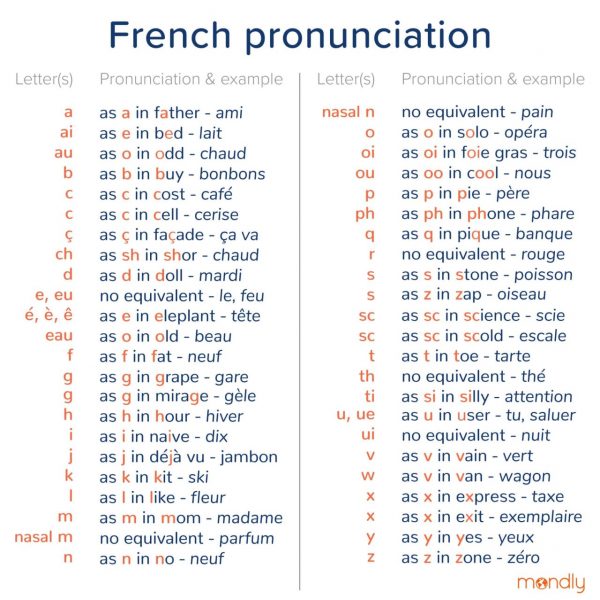7 French Movies That Will Inspire You to Learn the Language of Love
If you are trying to learn French these days, here are 7 French movies that will inspire you to learn the language of love.
French is like a neverending ode to the gods of languages but indeed challenging to pronounce for some of us. Challenging, but not impossible.

The French accent is considered to be very elegant and even sexy. French language lovers such as yourself can agree that hearing a French native speaking is almost mesmerizing. Merde! Even swear words sound like an ode to the gods of languages. However, the unique French pronunciation can be hard to achieve if you are not French-born. But not impossible, especially if you use our French pronunciation guide!
If you work hard and train your speech muscles accordingly, you’ll be able to master the infamous French “r” and speak French très bien in no time. The best way to learn French pronunciation is not a secret. All you need is a well-organized routine and efficient learning resources to match your needs. For starters, you can try Mondly because it includes crystal-clear audio recorded by fluent French voice artists so you can learn from the best. We’ll just start you off with some French words and phrases/expressions.
Long story short: because it uses sounds you aren’t used to pronouncing. Unlike English, where stress can fall on any syllable of the word, French is more evenly stressed. This means that each syllable gets equal time, whether it is stressed or not. Do you like the French pronunciation rules so far?
Additionally, another thing that causes confusion is the fact that – although having similar alphabets – English and French use different sounds for specific letters or groups of letters. Naturally, your brain associates these letters with the English sounds you already use and know.
Last but not least, your speech muscles aren’t used to these specific French sounds. It may seem ridiculous, but learning a new language is somehow like going to the gym. If the language you are trying to learn uses different speech muscles than your mother language, you may experience muscle soreness. Basically, you have to train both your brain and speech muscles in order to speak French comme un natif (like a native).
There’s no need to worry, though. As you yourself find French difficult to pronounce, French people sometimes find English hard to pronounce. Luckily, with the right training, speaking French can be as simple as saying bonjour or de rien (that’s you’re welcome in French).
The same as English, French uses the 26-letter basic Latin script, with four diacritics appearing on vowels – circumflex accent, acute accent, grave accent, diaeresis – and the cedilla in “ç”.
Using these 26 letters, 36 different sounds are created (in contrast to the 44 sounds in English). 14 of them are vowel sounds (of which six aren’t found in English) and 22 are consonant sounds (of which four aren’t found in English).
To help you get started with the magique French sounds, we put together this simplified pronunciation chart:

It’s not a 100% faithful transliteration of French sounds, but neither can it be. As you already saw, there are many French sounds that don’t exist in English, so we’ll have to improvise. Don’t worry, though. Read on and you’ll discover how to correctly pronounce some of the most difficult of them. Remember, we’re only focusing on pronunciation, not French grammar here. We’ll tackle that in the next French lessons.
There’s no denying that French pronunciation can be challenging. Depending on your ability (or inability) to mimic sounds, speaking French with a French accent can be a piece of cake or a hornet’s nest. Here are some of the most infamous French pronunciation challenges and how to overcome them. For practice, you may start with the days of the week in French pronunciation.
The Holy Grail of French pronunciation. The Gioconda of French pronunciation. And yet… an endless source of headaches for almost every beginner learning French: the infamous French “r”.
It seems as though knowing how to pronounce the French “r” will make you sound like a native on the spot, but that’s not true. Not everyone can master the guttural “r”. And you know what? No one will judge you if your French guttural “r” is not spot on. Besides, even French speakers don’t give up that “uvular trill” sometimes.
Depending on what is your native language, the key is to practice several times before you find the sound closest to what you dream to achieve. There’s no secret. Just keep “r”-ing until you get it. You’ll eventually get there.
Repeat the phrase regardez mon frère and find out where right now.
If you think about it, they all sound almost the same. But French is a language of subtle differences. Differences you will manage to master practicing.
Luckily, there is a starting point for pronouncing the French “u”. Step one is to start by shaping your lips into an “ooh” sound. Got it? Ok, now make your tongue say “eee”.
Aaaand you just said your first French “u” sound. Cool, isn’t it?
To master the other variables, you just have to continue practicing.
Nasal sounds in French are just as important as the “r”. Maybe even more important. While it may not be utterly necessary to use that specific guttural “r”, the nasal sounds are a must.
So how do you do it? For example, start saying the word “song”, but stop just before your throat closes to produce the “ng” sound. Voilà ! You’ve just pronounced the French word cent (“hundred”).
To practice the pronunciation of “in”, ”ain” or ”eint”, start saying the word “clang” and stop just before your throat closes into the “ng” sound. Now, try again without the “kl” sound in the beginning. It’s easy!
There are so many “e”s in French! How are they actually pronounced? Well, let’s see.
ë is the easiest because it is always pronounced as “e” in “bet” (the open “e”) no matter what letters accompany it.
è is pronounced the same – namely as “e” in “bet” – and it commonly appears in verb conjugations to mark the correct pronunciation. For example, acheter (to buy) is pronounced [ah-shuh-teh] and the middle “e” is reduced because it is the last letter of the syllable. Nevertheless, when we conjugate the verb, we need the grave accent to know how to pronounce it correctly: j’achète [ah-shet].
é is pronounced the same way you pronounce it in the English word “may”, but without the second part of the vowel sound associated with the letter “y”.
ê is pronounced the same way as è.
Well, not very different from each other, are they?
Now, let’s talk about some letters you don’t actually get to pronounce: the silent letters.
So, how do you actually know which ones not to pronounce? Well, French silent letters can be divided into three categories: E muet, H (aspiré and muet) and most final consonants.
While the first two are clear as day, “most final consonants” may seem a bit ambiguous. However, given the fact that you are only getting started, remember this: there are six French consonants that are usually silent at the end of a word.

To put it simply, French liaisons or French connecting sounds bind together two words by blending the last letter of a word with the first letter of the following word.
Although this makes it difficult for a beginner to determine where one word ends and the next one begins, liaisons give a certain flow to the French language. If used correctly, liaisons can make spoken French sounds like a continuous melody or – as we said before – a neverending ode to the gods of languages. Thus, they are definitely useful for someone who wants to perfect their French accent and pronunciation.
So, how do you actually pronounce letters in French liaisons? Well, it depends on the context. For example, chez (as in “as someone’s home”) is pronounced “shay” (no “z” at the end) on its own. But if you want to say chez Anne, you use the “z” to join the two words in a single, continuous pronunciation: “shay zanne”. It makes sense, doesn’t it?
Now, some of these liaisons are optional, others are required, and some are forbidden (or, if you liked the well-known novel Les liaisons dangereuses, you can simply say they are dangerous to use). Let’s get into a little more detail.
Generally, liaisons between syntactically related words (like an article and a noun, a pronoun and a verb or a noun and its adjective) are required. Of course, there are always exceptions, but the rule applies most of the time and it can help you improve your French pronunciation fast. Here are a few examples:
Some French liaisons are completely forbidden and if you want to speak French like a native, you should avoid them. This happens to avoid confusion with a similar expression or simply because, grammatically, these words aren’t linked enough to require a vocal link. Here are some situations where you shouldn’t use a liaison:
*h aspiré is different from h muet (“mute h”). It’s true that in French “h” is always a silent letter. However, in Old and Middle French, on certain words, the “h” was pronounced. This is why, if you want to say les hôpitaux (“hospitals”), there is a liaison between the two words because the “h” is muet and not aspiré.
This time, it is up to you whether to use the liaison or not. But you should know from the beginning that when the liaison is optional, most people choose not to use it.

There is no magic recipe that works for everyone. The key is to be persistent and find out what suits you best. Whenever you want to learn something – anything – new, daily practice is required. Even when it comes to French accent and pronunciation. If at first you don’t succeed, don’t give up. Success is the sum of our failures.
Here are some activities that can speed up your learning process and help you sound like a French native:
Bonne chance!
Do you want to speak French fluently fast? Get Mondly, the award-winning language learning app that will help you speak French as if it were your first language.
It’s true: it can be really tricky to master French pronunciation if you don’t actively live in a French-speaking country. But with Mondly, you’ll have access to a unique, fast and highly efficient learning method that allows you to learn French naturally with practical topics, authentic conversations and bite-sized Daily Lessons.
Get Mondly now and speak French like you never dreamed you would!

If you are trying to learn French these days, here are 7 French movies that will inspire you to learn the language of love.

“Les jours de la semaine” in French. From Monday to Friday and beyond.

Elevate your French with our curated list of French books for beginners. 🚀
Sounds too easy.